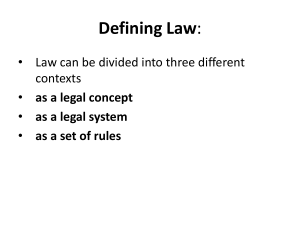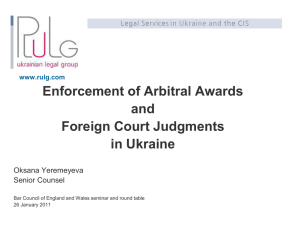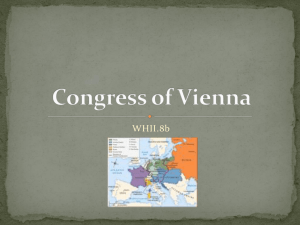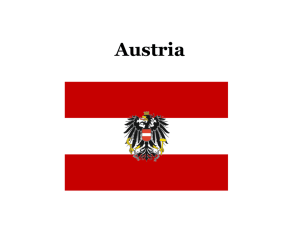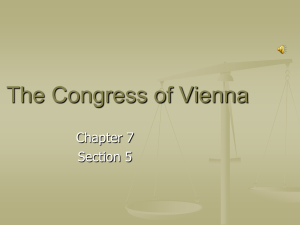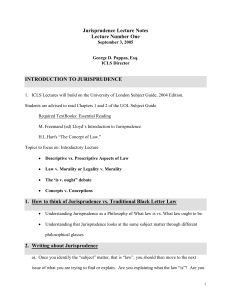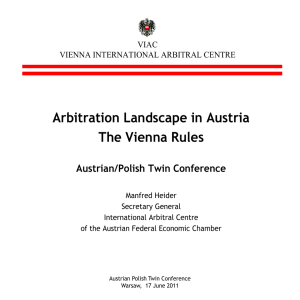Treaty interpretation
advertisement
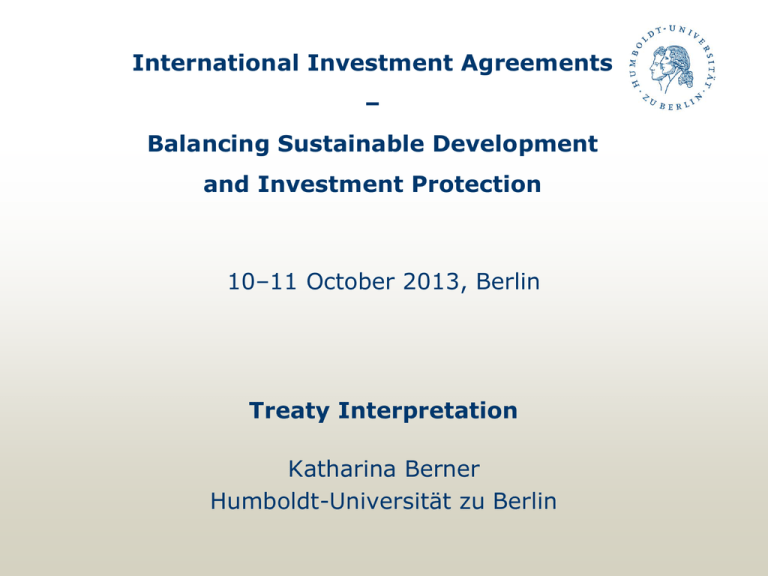
International Investment Agreements – Balancing Sustainable Development and Investment Protection 10–11 October 2013, Berlin Treaty Interpretation Katharina Berner Humboldt-Universität zu Berlin Introduction • Is it possible to reconcile sustainable development concerns and investment protection by using the Vienna rules on interpretation? • Do arbitral tribunals actually use the Vienna rules‘ potential to reconcile sustainable development concerns and investment protection? How the Vienna rules operate • the object & purpose • Article 31(1) VCLT: A treaty shall be interpreted in good faith in accordance with the ordinary meaning to be given to the terms of the treaty in their context and in the light of its object and purpose. How the Vienna rules operate • one-dimensional object & purpose of IIAs? • Lemire v Ukraine • ‘…”promote greater economic cooperation” between the Parties. … And the purpose of Article II.6 is trade-related: to avoid that States impose local content requirements as a protection of local industries against competing imports. When in 2006 Ukraine amended the Law …, the underlying reasons were not to protect local industries and restrict imports, but rather to promote Ukraine’s cultural inheritance, a purpose which is compatible with … the BIT.’ How the Vienna rules operate • the context: • Article 31(1) VCLT: A treaty shall be interpreted in good faith in accordance with the ordinary meaning to be given to the terms of the treaty in their context and in the light of its object and purpose. • Article 31(3)(c) VCLT: There shall be taken into account, together with the context … any relevant rules of international law applicable in the relations between the parties. How the Vienna rules operate • potentially relevant ‘other rules’: • Convention on Long-range Transboundary Air Pollution • Convention for the Protection of the Ozone Layer • Convention on Biological Diversity • Convention on the Protection of the Underwater Cultural Heritage • Convention for the Safeguarding of Intangible Cultural Heritage • Convention concerning the Protection of the World Cultural and Natural Heritage • … Review of arbitral jurisprudence Arbitral jurisprudence • outcome of arbitral awards • no inherent bias towards investment protection • ‘all or nothing’ approach predominating • ‘balanced’ approach the exception Arbitral of Review jurisprudence arbitral jurisprudence • the ‘single combined operation’ • no hierarchy within Article 31 VCLT • all relevant means must be applied • example 1: Biwater Gauff (Tanzania) Ltd v Tanzania Arbitral of Review jurisprudence arbitral jurisprudence • example 2: Unglaube and Unglaube v Costa Rica • ‘Expropriatory environmental measures – no matter how laudable and beneficial to society as a whole – are … similar to any other expropriatory measures that a state may take in order to implement its policies…’ • example 3: Methanex v United States • ‘As a matter of general international law, a non-discriminatory regulation for a public purpose, which is enacted in accordance with due process and which affects, inter alios, a foreign investor or investment is not deemed expropriatory and compensable…’ Review of arbitral jurisprudence • Article 1110 NAFTA : Expropriation and Compensation 1. No Party may directly or indirectly nationalize or expropriate an investment of an investor of another Party in its territory or take a measure tantamount to nationalization or expropriation of such an investment ("expropriation"), except: (a) for a public purpose; (b) on a non-discriminatory basis; (c) in accordance with due process of law and Article 1105(1); and (d) on payment of compensation in accordance with paras 2 – 6. Review of arbitral jurisprudence Arbitral jurisprudence • inadequate consideration of contextual arguments • example: Chemtura v Canada • 1998 Protocol on Persistent Organic Pollutants; 1979 Convention on Long-range Transboundary Air Pollution; 2001 Convention on Persistent Organic Pollutants • (+) Conclusion Critical appraisal • Investor-state arbitration is not inherently biased towards investment protection or sustainable development concerns. • The Vienna rules have the potential to reconcile investment protection and sustainable development concerns. • Arbitral tribunals do not use this potential, see esp. • interpretation not approached as single combined operation • inadequate consideration of contextual arguments
